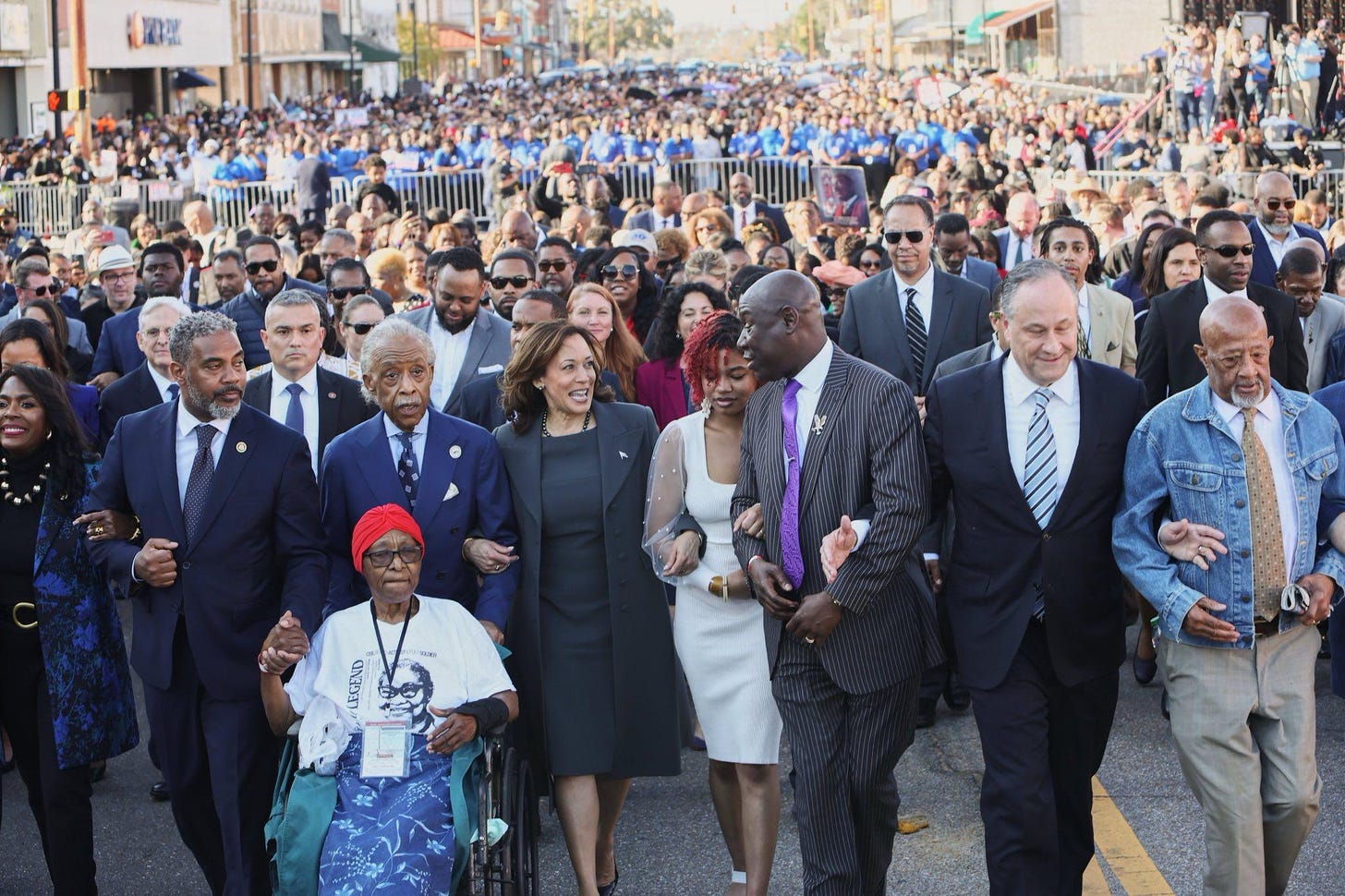Vice President Harris delivered remarks in Selma, Alabama, on the 59th anniversary of Bloody Sunday, emphasizing the ongoing struggle for rights and freedoms in the United States. She began by addressing the dire humanitarian crisis in Gaza, condemning the violence, and calling for immediate aid and a ceasefire. The Vice President reaffirmed the U.S. commitment to Israel's security while stressing the need to eliminate the threat posed by Hamas, which she labeled a brutal terrorist organization. Highlighting the severe humanitarian crisis, Vice President Harris urged Israel to enhance aid flow by opening new border crossings and removing unnecessary restrictions, pointing out the dire conditions and starvation faced by the people in Gaza.
Vice President Harris's comments follow a tragic incident in Gaza City, where over 100 Palestinians were killed while attempting to access food aid, underscoring the critical need for humanitarian assistance and a ceasefire.
Additionally, she called on Hamas to accept the terms of a ceasefire agreement to facilitate the reunion of hostages with their families and provide immediate relief to Gaza's population.
The Vice President then transitioned to the historical significance of Selma and the Edmund Pettus Bridge, celebrating the courage of the civil rights marchers who fought for voting rights and equality. Harris highlighted the progress made since then, such as the Voting Rights Act of 1965, while also noting current challenges to freedoms, including voting rights, women's reproductive rights, gun violence, LGBTQ rights, and the freedom to learn America's full history.
Vice President Harris criticized extremists for attacking fundamental freedoms and undermining democracy, pointing out specific restrictive laws and actions across states. She called for the passage of voting rights legislation and underscored the importance of activism and voting in protecting and advancing rights and freedoms.
In her closing remarks, The Vice President shared a personal inspiration drawn from a photograph of Amelia Boynton, a symbol of the struggle and resilience of civil rights activists. She framed the fight for justice as a relay race, urging continued organizing and activism to honor the legacy of past generations and secure a more just and free future for all.
Additional Source: Al Jazeera
Additional Source: National Museum of African American History & Culture
The National Security Council held a background press teleconference to discuss the humanitarian assistance airdrop into Gaza, reflecting on the dire situation and the U.S. government's efforts to provide aid. Senior officials expressed condolences for the recent tragic incident in northern Gaza. They emphasized the importance of delivering humanitarian aid to alleviate the suffering of Palestinians affected by the conflict with Hamas. The U.S. has been at the forefront, with President Biden personally engaging to ensure food, water, and medicine reach Gaza, including securing the opening of border crossings with Israel and Egypt.
Significant aid contributions, totaling $180 million since October 7th, have been made by the U.S. to respond to the humanitarian crisis. Despite these efforts, the flow of aid has been insufficient, prompting the announcement of airdrops into Gaza. These airdrops, conducted in collaboration with the Royal Jordanian Air Force, delivered 38,000 meals to civilians, with plans to be part of a sustained effort to increase the volume of life-saving aid.
The discussion also covered the complexities of aid distribution within Gaza due to lawlessness and the monopolization of aid by criminal gangs. The strategy to overcome this involves flooding the area with assistance from various entry points to demotivate these activities. Moreover, the potential for a ceasefire hinged on Hamas releasing vulnerable hostages, with a framework deal on the table accepted by Israel. The urgency of a ceasefire to facilitate humanitarian work and the critical importance of releasing hostages to achieve peace were highlighted.
Questions from the media focused on the effectiveness of the airdrop, the coordination for aid distribution, and the prospects of maritime aid delivery. Officials reiterated the U.S.'s commitment to exploring all avenues for aid delivery and the importance of international cooperation in these efforts. The briefing concluded with an emphasis on the ongoing negotiations for a ceasefire and the critical need to address the humanitarian crisis in Gaza, underscoring the U.S.'s dedication to supporting the Palestinian people amidst the conflict.
President Biden declared a major disaster in Vermont due to severe storms and flooding from December 18 to December 19, 2023. This declaration enables federal assistance to support state, tribal, and local recovery efforts in the impacted regions. The counties of Essex, Lamoille, Orange, Orleans, Rutland, Windham, and Windsor are eligible for federal funding to assist with emergency work and repairing or replacing facilities damaged by the storm and flooding. Additionally, federal funding is available statewide for hazard mitigation measures on a cost-sharing basis. William F. Roy from the Federal Emergency Management Agency (FEMA) is designated to oversee the federal recovery operations in the affected areas. Further designations may be made if more damage assessments reveal additional needs.
Vice President Harris as the march across the Edmund Pettis Bridge began in Selma, Alabama, on the 59th anniversary of Bloody Sunday




